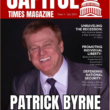For anybody familiar with this site, the following, published today in The Register, will be a reprise of a well-worn tale. But believe me…it’s still well worth the read…
Two and a half years ago, Overstock.com CEO Patrick Byrne penned an editorial for The Wall Street Journal, warning that widespread stock manipulation schemes – including abusive naked short selling – were threatening the health of America’s financial markets. But it wasn’t published.
“An editor at The Journal asked me to write it, and I told him he wouldn’t be allowed to publish it,” Byrne says. “He insisted that only he controlled what was printed on the editorial page, so I wrote it. Then, after a few days, he got back to me and said ‘It appears I can’t run this or anything else you write.'”
The Journal never changed its stance. But last week, the editorial finally saw the light of day at Forbes – after Byrne added a few paragraphs explaining that naked shorting had hastened what could turn out to be the biggest financial crisis since The Great Depression. (get the rest here)




Little Purple People and Credit Default Swaps: A Modern Fairy Tale
Once upon a time, in a land of rolling hills and plains bordered by deep blue seas, there was a large group of little purple people. They lived in funny cone-shaped homes, with neatly manicured green lawns that they would assiduously mow every weekend when they weren’t working on tending the fields, shuffling paper at the office or doing what it is that little purple people do.
One day, some of the little purple people in the financial sector had an idea. “Why not,” one little purple person said to his colleague, “help more little purple people buy these cone-shaped homes we all so love? We can set up loans where our purple friends need only put down a minimal amount of shiny rocks, or even none at all! How affordable and accessible! Better yet, we’ll set up new types of loans where the interest rate on their new shiny rock loan starts off low to encourage everyone!”
“Brilliant!” his bespectacled colleague responded, “and we’ll profit handsomely while doing good – everyone wins!”
“But wait,” a timid newcomer to the company meekly interjected, “what happens if some people do not have enough shiny rocks to afford these homes later on or these homes start to lose value? Whether they sign up because they are misled by our aggressive marketing or they sign up because they have a touch of greed in their own blood, many of these people will be set up for failure! And where we will get enough shiny rocks to lend out when demand skyrockets for this opportunity that you propose?”
“My friend,” the first purple person said with a look of paternal amusement, “worry not. The value of these cone-shaped homes just seems to rise and rise. Why, should any owner run into issues, they can just cash out at a profit! Why, I even suppose that some people can make a living – a good living – by buying cone-shaped homes, waiting a bit for the inevitable rise, and flipping!”
“But what about all the shiny rocks we will need if we want to make all these loans?” The timid newcomer spoke with a slight frown upon his face.
“Do not worry so much,” the first purple person said, now with a little smirk upon his face. “Once we lend out shiny rocks to one purple person, we will simply package the mortgage and sell it on the secondary market to some investor, who is then free to sell it to someone else, and so forth. Share the love, I say! Every time this happens we will free up our shiny rocks to lend to a lucky newcomer.”
“But doesn’t that encourage us to generate high loan volumes via risky loan practices, since we will not be the ones responsible for an eventual default?”
My, this naysayer was a persistent purple purveyor of doubt!
“You do ask good questions,” the first purple person smiled, “for which there is always a good answer. Why would someone on the secondary market of shiny rock loans take over our loans if they did not believe in their quality? I hear our friends in the Far East, who already buy much of our government debt in the form of treasury bonds, have quite an appetite for our private debt as well and will snatch up the loans on the secondary market. Ultimately, if people do not trust our due diligence in choosing who to give a shiny rock loan to, fine, but they will miss out on a great opportunity!”
And there issued silence in the office – it was so quiet that one could hear the air conditioner humming gently in the background.
“Fine, fine,” the first purple person continued, “if you are so worried, we will use credit default swaps, such that we will spread out the risk – the non-existent risk that troubles you greatly – among many parties. Suppose we, company A, make a loan to purple person B. We then package the mortgage and promptly sell it to party X, freeing ourselves to make more loans to persons C through W (how ambitious!). Party X is worried about the risk of default by person B, so they go to Party XX, which agrees to insure against default by person B. Now are you satisfied my friend?”
“Well,” the purple skeptic replied, “where is party XX going to get the necessary capital to truly insure all these loans, many of which have little or no shiny rock down payment as you say?”
“Please,” the confident first purple person said with a slight tinge of exasperation in his voice, “please do not worry so much and stand in the way of the massive shiny rock profits we are going to make! Who cares if Party XX and the other facilitators of the credit default swap market are slightly (or very) undercapitalized? If they only have 50 shiny rocks and are insuring 1000 shiny rocks of debt, that is 50 shiny rocks too much, for there will be minimal or no loan defaults when our beloved cone-shaped homes continue to appreciate! What the whole world needs is greater and greater financial leverage!”
“I see,” the purple skeptic replied, as he slowly inched towards the door.
And I will not go any further, for you all know how the rest of the story plays out, as this tale – if only it were merely a fairy tale – is known throughout the land. Rest assured, however, that the government of the little purple people, itself one of the world’s most voracious borrowers, is bailing out this crisis by borrowing lots more money and doing fancy things with it. Rest assured, furthermore, that politicians on both sides of the spectrum simultaneously plan to cut taxes for most of the little purple people. This, we are blithely told, isn’t merely deferring a massive problem to future generations – we would never do that to our children!
The moral of the story? Fairy tales may not just be fantastical tales you lovingly read your children every night. Indeed, like it or not, you just might be living in one.
Jason Hom is a medical student and a former Editor of Synapse.
Huge story Judd. Suddenly members of the media are questioning the integrity of the financial media relative to this issue and more importantly, the lengths the financial media will go to disell any alternative theories on naked shorting.
Question all must ask is: What incentive do people like weiss have in taking on such an act of deception? He risked his career so money had to have been involved and by whom.
Question: If the financial press can be pesuaded to take on such dishonorable actions, what would make those that entice stop there. How about economists who can gain access to public speeches? Economists like Bris from —-Yale for example.
Based upon this article, it’s time to back up the truck to the information vaults of the DTCC / NSSC.
You never know what you will find . . . in this case I know what you will find.
People who think they are above the law always leave tracks thinking they will never be caught. If caught, they have come to understand that the damages are far less than the bounties they received in committing the crime.
Supporting this overall belief is the fact that the guard and now, the reporter, is working with and for them so why worry.
It is time for them to start worrying.
Opinions anyone????
Statement of Securities and Exchange Commission Concerning Short Selling
Statement of Securities and Exchange Commission Concerning Short Selling
FOR IMMEDIATE RELEASE
2008-235
Washington, D.C., Oct. 1, 2008 — The Securities and Exchange Commission today issued the following statement concerning short selling:
The Commission has taken steps during recent weeks to address concerns regarding short sales in light of the ongoing credit crisis. These efforts relating to short sales have focused particularly on the securities of financial institutions whose health may have an impact on financial stability. The steps the Commission has taken are designed to ensure the continued smooth operation of orderly markets. Our actions have been taken in consultation with regulators of the major developed securities markets around the world, with whom we have coordinated in monitoring market reactions.
The Commission notes that short selling plays an important role in the market for a variety of reasons, including contributing to efficient price discovery, mitigating market bubbles, increasing market liquidity, promoting capital formation, facilitating hedging and other risk management activities, and importantly, limiting upward market manipulations. In addition, there are circumstances in which short selling can be used as a tool to mislead the market. For example, short selling can be used in a downward manipulation whereby a manipulator sells the shares of a company short and then spreads lies about a company’s negative prospects. This harms issuers and investors as well as the integrity of the market. This kind of manipulative activity is particularly problematic in the midst of a loss in market confidence. For example, in the context of a credit crisis where financial institutions face liquidity challenges, but are otherwise solvent, a decrease in their share price induced by short selling may lead to further credit tightening for these entities, possibly resulting in loss of confidence in these institutions.
The Commission has recently used its emergency authority to minimize the possibility of abusive short selling as the Congress works to provide a comprehensive plan to stabilize credit markets and the financial system. Under this authority, the Commission’s actions are limited to up to 30 calendar days, and may not be extended. To provide clarity about the future expiration of these actions, the Commission is announcing that each of the emergency orders issued on Sept. 17 and Sept. 18, 2008, will be extended to allow time for completion of work on the anticipated passage of legislation.
Specifically, the emergency orders cover the following:
Temporary prohibition of short selling in financial companies. This order will be extended beyond its currently scheduled expiration, to allow time for completion of work on the anticipated passage of legislation. It will expire at 11:59 p.m. ET on the third business day after enactment of the legislation, but in any case no later than 11:59 p.m. ET on Oct. 17, 2008.
Temporary requirement that institutional money managers report to the SEC their new short sales of certain publicly traded securities. This order will also be extended, to 11:59 p.m. ET on Oct. 17, 2008, but the Commission intends that the order will continue in effect beyond that date without interruption in the form of an interim final rule. The Commission will seek comments on all aspects of the anticipated rulemaking. Disclosure under the emergency order will be made only to the SEC.
Temporary easing of restrictions on the ability of securities issuers to repurchase their securities. This order will be extended beyond its currently scheduled expiration, to 11:59 p.m. ET on Oct. 17, 2008.
In addition to these emergency orders, the Commission recently has taken action to strengthen the existing ban on naked short selling and to increase the penalties against naked short selling. Each of these actions will continue in force following expiration of the Commission’s emergency orders. These actions include the following:
Hard T+3 close-out requirement for naked short selling; penalties for violation include prohibition of further short sales without mandatory pre-borrow. The Commission adopted, on an emergency basis, a new rule requiring that short sellers and their broker-dealers deliver securities by the settlement date (three days after the sale transaction date, or T+3) and imposing penalties for failure to do so. If a short sale violates this close-out requirement, then any broker-dealer acting on the short seller’s behalf will be prohibited from further short sales in the same security unless the shares are not only located but also pre-borrowed. The prohibition on the broker-dealer’s activity applies not only to short sales for the particular naked short seller, but to all short sales for any customer.
The emergency order will be extended, and will now expire at 11:59 p.m. ET on Oct. 17, 2008, but the Commission intends that the order will continue in effect beyond that date without interruption in the form of an interim final rule. The Commission will seek comments on all aspects of the anticipated rulemaking.
Repeal of exception for options market makers from short selling close-out provisions in Regulation SHO. This exception had permitted options market makers to maintain fail positions indefinitely. It was repealed effective at 12:01 a.m. ET on Sept. 18, 2008, through a final rule to eliminate the options market maker exception from the close-out requirement of Rule 203(b)(3) in Regulation SHO.
Rule 10b-21 naked short selling anti-fraud rule. The new rule, which became effective at 12:01 a.m. ET on Sept. 18, 2008, covers short sellers who deceive broker-dealers or any other market participants about their intention or ability to deliver securities in time for settlement. The rule makes clear that such persons are violating the law when they fail to deliver.
The Commission staff will continue to monitor the impact of the rules regarding short selling.
http://www.sec.gov/news/press/2008/2008-235.htm
I cannot imagine how anyone working at the DTCC particularly in the CNS area has not stepped forward to discuss the FTD situation with THE ATTORNEY GENERAL.
The DTCC has aided and abetted BILLIONS OF DOLLARS OF FAILED TRADES IN THESE “NOW PUBLIC ARCHIVES”.
There is no longer any mystery as to what has happened to shareholders money in the US equity markets.
http://www.sec.gov/foia/docs/failsdata-archive.htm
Frequently Requested FOIA Document:
Fails-to-Deliver Data — Archive Data
Note: files prior to May 2007 may not contain information in the Price field. Data prior to March 22, 2004, and for August 9, 2004, November 3, 2004, and November 4, 2004 is not available.
For current data, see the FOIA Fails-to-Deliver page.
Archive Data
2008, first quarter
2007, fourth quarter
2007, third quarter
2007, second quarter
2007, first quarter
2006, fourth quarter
2006, third quarter
2006, second quarter
2006, first quarter
2005, fourth quarter
2005, third quarter
2005, second quarter
2005, first quarter
2004, fourth quarter
2004, third quarter
2004, second quarter
Oh, now this is getting even more interesting!!!
Recs: 2 HEDGE FUNDS: THE NEXT SHOE TO DROP
FYI, hedge fund operators Paulson (John, not Hank), James Simons, George Soros et. al.
have been invited for afternoon tea (er Committee on Oversight and Government Reform
hearings) on Oct. 16:
http://www.speaker.gov/blog/
Take a look at the sample invitation letters, e.g.
http://oversight.house.gov/documents/20081002120615.pdf
to see which documents are “voluntarily” requested. I’ve already called my local house rep,
who is on the subcommittee, to determine that these will likely *not* be made public.
They are just interested in little things like whether each billionaire’s unregulated fund might pose
any “systemic risk” to what’s left of John Q. Public’s retirement fund, etc. Well, at least
the YouTube exposure might be educational…
You are correct Sean, just as I stated a few days back…My gut said the SEC would back down on disclosing this information….imagine that….scumbags
http://www.marketwatch.com/news/story/sec-backs-down-short-selling-disclosure/story.aspx?guid={1FC46375-2DBA-4C7B-964E-B9D95F78C416}
latest news
SEC backs down on short-selling disclosure rule
U.S. regulator extends short-sale ban pending bailout bill becoming law
By Alistair Barr, MarketWatch
Last update: 1:52 p.m. EDT Oct. 2, 2008
SAN FRANCISCO (MarketWatch) — The Securities and Exchange Commission backed down on a major part of its effort to limit short selling.
Late Wednesday, the regulator said that institutional investors’ short positions won’t be made public, a major change from an earlier ruling that had upset several prominent hedge-fund managers and short sellers including James Chanos.
Until Wednesday, the SEC’s emergency short-selling rules required fund managers to disclose major short positions on shares of roughly 800 financial-services stocks.
The regulator then planned to make those filings public, with a two-week delay. That was due to start in mid-October.
Chanos, head of leading short-selling hedge-fund firm Kynikos Associates LP, said at the time that forcing such public disclosure would be like asking Coca-Cola to reveal the super-secret formula for its popular fizzy beverage. See full story.
Also Wednesday, the SEC said the disclosure requirement would be extended indefinitely as an interim final rule. But it also noted that “disclosure under the emergency order will be made only to the SEC.”
That may well come as a relief to short sellers and other hedge-fund managers worried that public disclosure of their bearish bets might expose them to pressure from the companies they target.
“We appreciate … that the SEC has modified its short-sale disclosure emergency order to protect the confidentiality of investors’ portfolio management strategies,” said the Chanos-headed Coalition of Private Investment Cos., which represents hedge funds. “Forcing public disclosure would have had serious consequences for investors.”
The Managed Funds Association, another hedge-fund group, asked the SEC in a letter this week not to publicly disclose managers’ short positions, saying the agency’s concerns about short-selling activities “can be addressed adequately through disclosure to the commission and do not necessitate public disclosure of detailed short positions.”
Pension funds, endowments and foundations have suggested that they may have to pull their money from some hedge funds because of the “headline risk” associated with public disclosure of funds’ short positions, the Washington-based alternative-investments group warned.
The SEC’s decision not to publicly disclose these positions only applies to the emergency order. It’s still not clear whether the more permanent rule will include such disclosure.
The SEC also extended its ban on short sales of financial-services stocks until three days after the $700 billion financial-rescue legislation before Congress becomes law. The ban won’t run beyond Oct. 17, though.
“We remain concerned about the potential of sudden and excessive fluctuations of securities prices generally and disruption in the functioning of the securities markets that could threaten fair and orderly markets,” the SEC said in a statement Wednesday. End of Story
Alistair Barr is a reporter for MarketWatch in San Francisco.
My question is why did’nt the SEC do this? Don’t they have authority over Hedge Funds?
Sean,
The answer to why the SEC didn’t do this is that it is important for them to look like they might be doing something without actually doing anything. Getting the short positions of hedge funds into the public domain would give numbers that could be checked against the borrows. It could get ugly if this fraud came out at the same time as the $850 billion money grab.
Guys,
Thanks a lot for all the info gathered and posted on this website.
Earlier today, I added some comments on this topic: https://www.deepcapture.com/gasparino-reports-fluffy-yelps/
Summary: A wealthy and influential Dutch investor claimed, past sunday, that it were not hedge funds who attacked Bear Stearns, but J.P. Morgan. He continued by saying, it was factually Bear Stearns that saved J.P. Morgan from a massive disaster. How and what? Just check my post under the Gasparino topic.
Secondly, I have some confidential documents and emails to share. Regarding a.o. proof of collusive payments, in terms of $multi-millions, to two Milberg Weiss partners by a NYC hedge fund manager. Secondly, emails between a Long Beach, California based, Federal Investigator and myself, wherein the involved Federal Investigator writes me, inter alia, that in the criminal Milberg Weiss probe, a lot was ‘allowed’ to be investigated, but that ‘they’ were not sure of investigating all possible misconduct related to the MW gang. Etc. etc.
So I repeat my request, as posted under the Gasparino topic: I claim to possess some unique material and am willing to share for evaluation/publication etc. etc.
May I kindly ask you to drop me an email, so I can forward you some interesting material;-)
Thanks in advance!
Seems like they will get away with it.
Obama should get this “deepcapture” team into his office right away.
The material I have been reading here shocks me. Not that I didn’t suspect or followed the Overstock story, but its about the coverup.
I am disgusted to see my tax dollars used to cover this up and pay salaries to those that were in a position to stop it. Whats the point of hiring experts if they are clued out.
Stunned,
Welcome to The Rabbit Hole.
Patrick